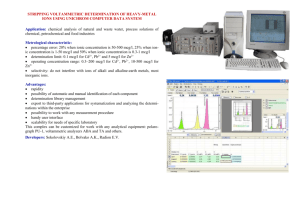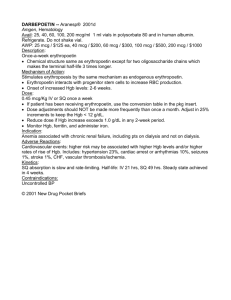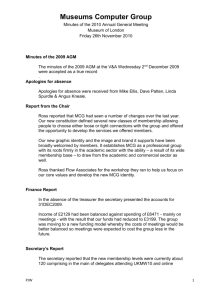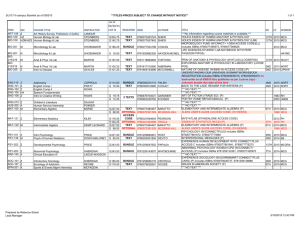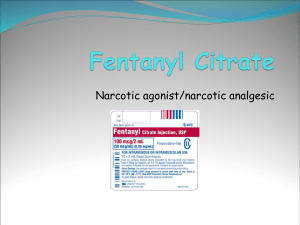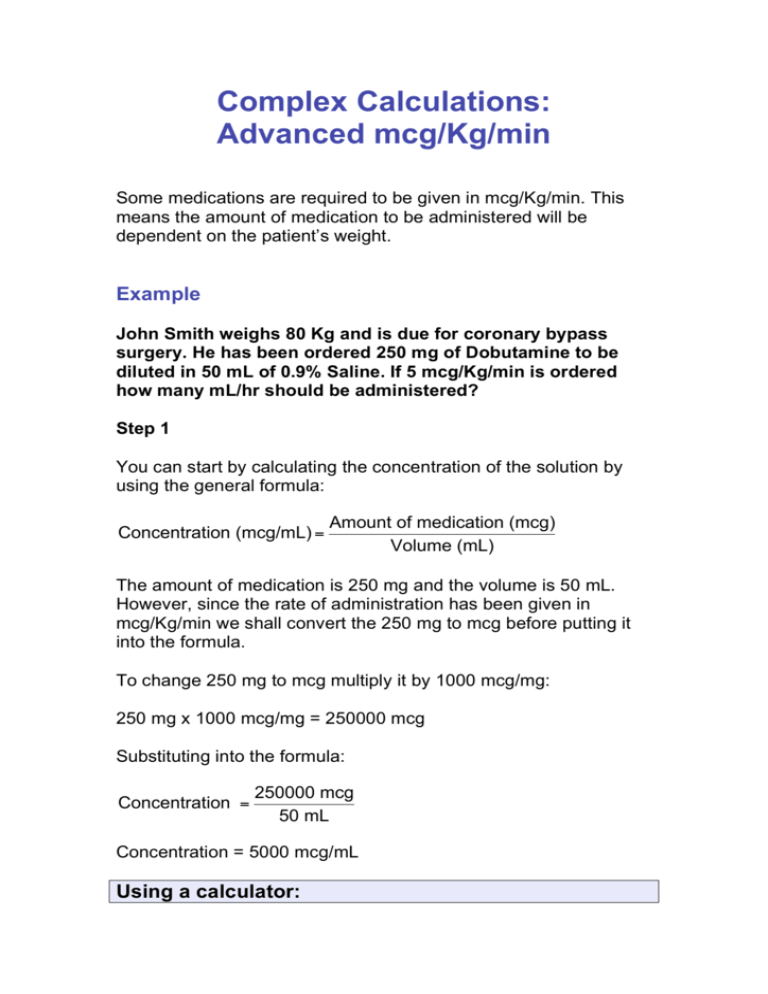
Complex Calculations:
Advanced mcg/Kg/min
Some medications are required to be given in mcg/Kg/min. This
means the amount of medication to be administered will be
dependent on the patient’s weight.
Example
John Smith weighs 80 Kg and is due for coronary bypass
surgery. He has been ordered 250 mg of Dobutamine to be
diluted in 50 mL of 0.9% Saline. If 5 mcg/Kg/min is ordered
how many mL/hr should be administered?
Step 1
You can start by calculating the concentration of the solution by
using the general formula:
Concentration (mcg/mL) =
!
Amount of medication (mcg)
Volume (mL)
The amount of medication is 250 mg and the volume is 50 mL.
However, since the rate of administration has been given in
mcg/Kg/min we shall convert the 250 mg to mcg before putting it
into the formula.
To change 250 mg to mcg multiply it by 1000 mcg/mg:
250 mg x 1000 mcg/mg = 250000 mcg
Substituting into the formula:
Concentration =
250000 mcg
50 mL
Concentration = 5000 mcg/mL
!
Using a calculator:
To solve this using a calculator enter:
250000 ÷ 50 =
which gives an answer of 5000 mcg/mL.
Step 2
Start by calculating the rate needed based on the patient’s weight
by using the following formula:
Rate (mcg/min) = Rate ordered (mcg/Kg/min) x Patient’s weight (Kg)
From the question the rate ordered is 5 mcg/Kg/min and the
patient’s weight is 80 Kg.
Rate (mcg/min) = 5 mcg/Kg/min x 80 Kg
= 400 mcg/min
Using a calculator:
To solve this using a calculator enter:
5 x 80 =
which gives an answer of 400 mcg/min.
This means that based on John’s weight of 80 Kg a rate of
administration of 400 mcg/min is required.
Step 3
At this point you should look at the final units required which are:
mL/hr. This means that all references in time should be expressed
in hours.
You will therefore need to change the rate of administration of the
medication from 400 mcg/min to a quantity in mcg/hr. This can be
achieved by multiplying it by 60 min/hr as there are 60 minutes in
an hour.
Rate (mcg/hr) = Rate (mcg/min) x 60 min/hr
= 400 mcg/min x 60 min/hr
= 24000 mcg/hr
Using a calculator:
To solve this using a calculator enter:
400 x 60 =
which gives an answer of 24000 mcg/hr.
Step 4
Referring to the formula presented in the topic above called Rate
of administration of the dilutant, to calculate the required rate of
administration in mL/hr you need to divide the rate of
administration in mcg/hr by the concentration in mcg/mL:
Rate (mL/hr) =
!
Rate (mcg/hr)
Concentration (mcg/mL)
Rate (mL/hr) = 24000 mcg/hr ÷ 5000 mcg/mL
Rate = 4.8 mL/hr
All mL/hr calculations should be rounded to the closest whole
number and therefore the final answer is 5 mL/hr.
Using a calculator:
To solve this using a calculator enter:
24000 ÷ 5000 =
which gives 4.8 mL/hr.
Rounding to the closest whole number gives an answer of 5 mL/hr.
Example
Paula weighs 65 Kg and is ordered Noradrenaline 4 mg in 100
mL of 5% Dextrose at 45 mL/hr. How many mcg/Kg/min will
she receive?
Step 1
You can start by calculating the concentration of the solution by
using the general formula:
Concentration (mcg/mL) =
!
Amount of medication (mcg)
Volume (mL)
It should be noted that the answer must be given in mcg/Kg/min,
which means that all quantities expressed in mg should be
changed to mcg.
The amount of medication is 4 mg which when multiplied by
1000 mcg/mg gives 4000 mcg. Putting this into the formula with
the volume of 100 mL gives:
Concentration =
4000 mcg
100 mL
Concentration = 40 mcg/mL
!
Using a calculator:
To solve this using a calculator enter:
4000 ÷ 100 =
which gives an answer of 40 mcg/mL.
Step 2
The final answer must be given in mcg/Kg/min.
To calculate this, start by finding the required dosage in mcg/min.
This can be achieved by using the formula shown earlier in the
section called rate of administration of the medication:
Rate (mcg/hr) = Concentration (mcg/mL) " Rate (mL/hr)
!
The concentration is 40 mcg/mL and the rate of administration of
the fluid is 45 mL/hr:
Rate (mcg/hr) = 40 mcg/mL " 45 mL/hr
Rate = 1800 mcg/hr
!
Using a calculator:
To solve this using a calculator enter:
40 x 45 =
which gives an answer of 1800 mcg/hr.
Step 3
From Step 2 you now know the required rate is 1800 mcg/hr. To
find the rate in mcg/Kg/hr you should divide this answer by the
patient’s weight in kilograms, which is 65 Kg.
Rate (mcg/Kg/hr) = Rate (mcg/hr) ÷ Patient’s weight (Kg)
Rate (mcg/Kg/hr) = 1800 mcg/hr ÷ 65 Kg
!
!
In addition, as the rate has been expressed in hours you should
also divide this by 60 min/hr to change it to minutes as you are
required to state your answer in minutes.
Rate (mcg/Kg/min) = 1800 mcg/hr ÷ 65 kg ÷ 60 min/hr
Rate (mcg/Kg/min) = 0.46153846 mcg/Kg/min
= 0.46 mcg/Kg/min
!
This answer should always be rounded to 2 decimal places.
Using a calculator:
To solve this using a calculator enter:
1800 ÷ 65 ÷ 60 =
which gives 0.461538461 mcg/Kg/min.
Rounding to 2 decimal places gives an answer of 0.46
mcg/Kg/min.
Example
Mrs Harisson must receive Lignocaine 0.025 mg/Kg/min. It is
available as 2 g in 500 mL of 5% Glucose. If Jenny weighs 70
Kg:
a) How many mg/min will she receive?
b) How many mg/hr will she receive?
c) What is the rate in mL/hr?
a) To find the required dose in mg/min multiply the rate in
mg/Kg/min by the patient’s weight in Kg:
Rate (mg/min) = Rate (mg/Kg/min) " Patient's weight (Kg)
Rate (mg/min) = 0.025 mg/Kg/min " 70 Kg
Rate (mg/min) = 1.75 mg/min
!
!
The rate of administration of the medication should always be
rounded to 2 decimal places.
Using a calculator:
To solve this using a calculator enter:
0.025 x 70 =
which gives an answer of 1.75 mg/min.
b) To calculate the rate in mg/hr simply multiply the rate in mg/min
by 60 min/hr as there are 60 minutes in 1 hour:
Rate (mg/hr) = Rate (mg/min) " 60 min/hr
Rate (mg/hr) = 1.75 mg/min " 60 min/hr
Rate (mg/hr) = 105 mg/hr
!
!
Using a calculator:
To solve this using a calculator enter:
1.75 x 60 =
which gives an answer of 105 mg/hr.
c) To calculate the required rate in mL/hr start by calculating the
concentration of the solution by using the general formula:
Concentration (mg/mL) =
!
Amount of medication (mg)
Volume (mL)
The amount of medication has been expressed in grams and we
will need to change this to mg as all other quantities given to us in
the question are expressed in mg.
To change 2 g to mg multiply it by 1000 mg/g, which gives 2000
mg.
Putting this into the concentration formula with the volume of 500
mL gives:
Concentration =
2000 mg
500 mL
Concentration = 4 mg/mL
!
Now you know the concentration in mg/mL and also the rate of
administration of the medication in mg/min. To calculate the rate of
administration in mL/hr you must use the following formula:
Rate (mL/hr) =
!
Rate (mg/hr)
Concentration (mg/mL)
The formula asks for the rate in mg/hr and you currently have it
expressed in mg/min. You must therefore change this so that it is
expressed in mg/hr before putting it into the formula. To change a
rate in mg/min to a rate in mg/hr you should multiply it by 60
min/hr, as there are 60 minutes in 1 hour.
Rate (mg/hr) = Rate (mg/min) " 60 min/hr
Rate (mg/hr) = 1.75 mg/min " 60 min/hr
Rate (mg/hr) = 105 mg/hr
!
!
Using a calculator:
To solve this using a calculator enter:
1.75 x 60 =
which gives an answer of 105 mg/hr.
Now using this value in the formula to calculate the rate in mL/hr:
!
!
Rate (mL/hr) =
Rate (mg/hr)
Concentration (mg/mL)
Rate (mL/hr) =
105 mg/hr
4 mg/mL
Rate = 26.25 mL/hr
This should always be rounded to the closest whole number and
so the final answer is:
Rate = 26 mL/hr
Using a calculator:
To solve this using a calculator enter:
105 ÷ 4 =
which gives 26.25 mL/hr.
Rounding to the closest whole number gives an answer of 26 mL/hr.
© 2002-2010 IntelliLearn Pty Ltd. All Rights Reserved

